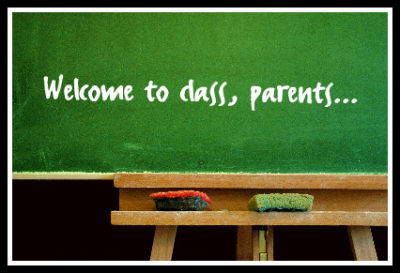Every year my school has a Back to School Night for parents the evening before school starts. Children and parents move freely from room to room, greeting teachers, checking out the gym and library, signing up for the PTSA. We end the evening with some food out on the playground. And we start school the next day.

Every year I have my own Back to School Night for the parents in my room sometime in the first week of school. The children are not invited. For one thing, there isn’t enough room, and for another, they’ve already heard everything I’m going to say.
I tell the parents all the details that I’ve already told the students about rules, policies, and procedures, including how I communicate with parents during the year. I tell them about the curriculum and grading. I seek out classroom volunteers.
Then I talk about how important I consider parents to be. I have taught since 1977, and I’ve taught gifted since 1983. I have the MA plus 90 plus I’ve lost track of how many credits since then. I just keep taking classes. (I went to a great set of classes this summer!)
I have a wealth of experience and expertise in my field.
But I see students for, at most, about six hours each day. I am educating their child for a year.
Parents have their children for their whole lives.
Parents have the wealth of experience and expertise in their own children.
I tell parents I see us as partners, and, in many ways, I see myself as the junior partner as we work together.
I can help them understand the demands of the educational system, but they can help me understand the needs of their child.
Having that kind of attitude toward parents helps build collaborative relationships, as well as mutual respect.
Sometimes I need to do more. One time a parent was trying to have her child placed in the self-contained gifted class—in my classroom. The teachers who knew her came up to me and warned me about her, how pushy she was, how hard to get along with.
The day she came to my classroom to tell me her son had been accepted into my class, I threw my arms wide and said, “Welcome to my room!”
I made her cry. From that moment on I could do no wrong.
Now, don’t get me wrong, I do wrong all the time. I made mistakes and screw up with the best of them. But I have a good working relationship with my parents. So most times they come to me to talk to me about what I did.
Last year at spring conferences, at the end of the conference, one mom took a deep breath and said, “Jan, I have to tell you, you said something that really bothered me.”
“Oh, no, what did I say?”
She told me, and I responded, “Oh my gosh, I’m so sorry.” I apologized thoroughly.
(I was probably 40 years old before I figured this out: Don’t explain. Don’t defend yourself. Just apologize.)
We talked some more and on the way out I asked, “Do you forgive me?”
She laughed and said, “Of course!”
Light and easy.
Having a collaborative relationship really helps with dual identified children, or with children who are gifted and have other social-emotional needs. I had so many of those last year. I was in daily contact with several parents, just to keep them abreast of how things were going in the classroom. I would hear back about how things were going at home. Between us, we tried to keep all those little ships on an even keel.
Every year I look forward to greeting my new students. But every year I also look forward to greeting my new team of adults—who will help me work with those students—the parents of my students.
I love that you’re welcoming not just the students but also the adults. What a great strategy!